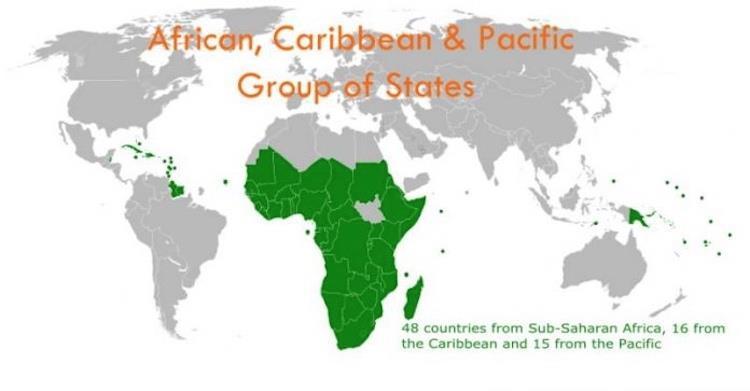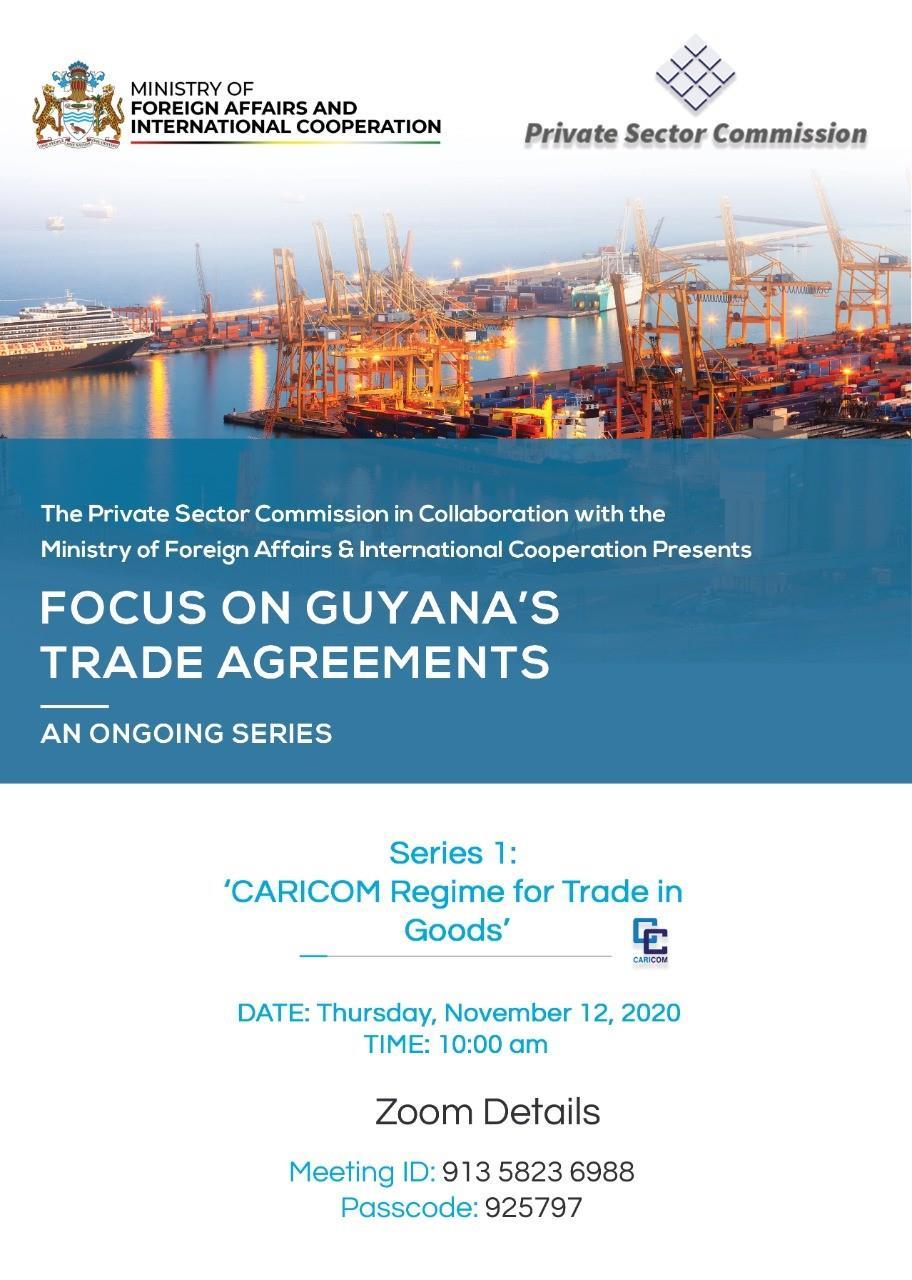
5 minute read
KEY DEVELOPMENTS IN GUYANA’S TRADE POLICY FRAMEWORK
New UK Policy on Sugar Quotas
On 19 May 2020 the UK announced its intention to apply an autonomous tariff rate quote (ATQ) as part of the new UK Global Tariff (UKGT). The UKGT will replace the EU’s Common External Tariff (CET), which the UK currently applies, when the transition period ends, from 1 January 2021. This policy would allow a set volume of raw cane sugar (260,000 MT) to enter the UK tariff free at 0% rate of duty with an out of quota rate of £28.00/100kg for 12 months, effective 1 January 2021. The UK has indicated that the purpose of the ATQ is to address a deficit in sugar for human consumption; to ensure that the raw cane sugar refining sector can source competitively priced raw cane sugar; and for food security reasons. The UK sugar market produces around 1.9MT of refined white sugar per annum and is made up primarily of sugar cane refining, UK sugar beet refining and EU white sugar imports. Following reforms to the EU sugar regime which led to removal of sugar beet production quotas from 1 October 2017, the market share for sugar beet in the UK grew to about 55% and sugar cane’s share of the UK market reduced from 50% to about 15-20%. Most of the UKs sugar cane refining is based on raw cane sugar imported from the ACP and LDC countries and Brazil. ACP sugar enters the UK tariff-free. The figure below identifies the main suppliers of sugar cane to the UK.
Advertisement
UK imports of raw cane sugar (HS code 170114, 17-19 average)

The UK government opened public consultation on this new policy for three weeks, from 14 September 2020 to 5 October 2020. The ACP group of sugar producers made a joint submission at the three-week Public Consultation. Among the concerns raised by the ACP grouping is that there is no evidence of a verified shortage of sugar in the UK to justify the proposed quota amount of 260,000 MT. The group explicitly indicated that it was not opposed to the ATQ as a policy tool but that the ATQ is ordinarily used as a stabilization tool and should take into consideration both domestic production and supply from preferential sources. However, it would appear as though no consideration was given to preferential suppliers under the Economic Partnership Agreement in setting the quota rate. The UK deficit is projected at 419,836 tons. However, the ACP supply to the UK in 2018/2019 was 344,572 tons of raw cane sugar for refining (tariff heading 1701.13.10 and 1701.14.10) and 77,653 tonnes raw cane sugar for other than refining (tariff headings 17011390, 17011490), with the ACP countries having the capacity to produce an exportable surplus of 2.422 million tons of sugar. The UK only took its domestic supply into consideration in setting the quota amount.
Ministerial Order signed to give effect to the CARIFORUM-UK Economic Partnership Agreement
On December 30, 2020, the Honorable Minister of Finance Dr. Ashni Singh signed and issued a Ministerial Order that gives effect to the CARIFORUM-UK EPA. The UK formally exited the EU on January 31st, 2020 but was on a transition that ended on December 31st 2020. During the transition period, trade between CARIFORUM states and the UK was governed by the CARIFORUM-EU EPA. However, as of

December 31st 2020 the CARIFORUM-EU EPA ceased to apply to trade between CARIFORUM states and the UK and the CARIFORUM-UK EPA took effect. The Ministerial Order was instrumental in ensuring that Guyana was ready to apply the CARIFORUM-UK EPA effective from January 1st 2021. The CARIFORUM-UK EPA now governs Guyana’s trade with the United Kingdom. Guyana signed the CARIFORUM-UK Economic Partnership Agreement and a Memorandum of Understanding to provisionally apply the Agreement on March 22, 2019. Steps were also taken to facilitate the ratification of the Agreement and full amendment of the Customs Act, as well as amendment of all internal administrative arrangements required to facilitate trade with the independent UK. Guyana and the other CARIFORUM States have also exchanged Notes with the UK that would give due recognition to the situation of Northern Ireland.
Geographical Indications for Heart of Palm, Greenheart wood and Rice

Technical specifications and market access guides have been completed for Heart of Palm, Greenheart wood and Rice through technical support from the Organisation of African, Caribbean and Pacific States (OACPS) TradeCom II support Programme. The completion of the technical specifications will allow each product to be registered as a Geographical Indication (GI) under the Geographical Indications Act, improving their capacity to compete in niche markets and attract premium prices.
Renewal of the Caribbean Basin Trade Partnership Act (CBTPA)

On September 30, 2020 the United States (US) Senate voted unanimously to renew the Caribbean Basin Trade Partnership Act (CBTPA) until September 30, 2030. The renewal of the CBTPA, like the CBERA, is extremely important to Guyana’s economy and Foreign Trade Policy, as it guarantees Guyanese Companies/exporters sustained access to the US market for products eligible for duty-free treatment such as textiles and apparel and; petroleum and petroleum derivatives.
A New Post-Cotonou Partnership Agreement between the European Union and African, Caribbean and Pacific (ACP) states

Negotiations for a New OACPS-EU Partnership Agreement have now been completed. Negotiations had been formally launched during September 2018 but culminated on December 3rd , 2020 with a new Agreement accepted by both parties. The negotiations were along the following strategic pillars: Trade, investment, industrialisation and services; Development cooperation, Technology science and innovation/research; and Political dialogue and advocacy and covered a wide range of development issues including migration, sexual orientation and gender identity, Sexual Reproductive Health and Rights (SRHR) and Culture – the issue of recovery and return of cultural property. The new Agreement is set to be initialed and signed off in 2021. It will replace the existing Cotonou Partnership Agreement which was signed in 2000 and initially set to expire on February 28, 2020 but was extended to June 30, 2021 to facilitate completion of the negotiations for the Post-Cotonou Agreement.

Trade Talk Series
A ‘Trade Talk’ series with the Private Sector Commission has been developed and commenced on November 12, 2020. The series will entail quarterly webinars aimed at deepening the private sector’s understanding of Guyana’s trade agreements. The first series focused on the CARICOM regime for Trade in Goods. Look out for the next series on January 28th that will focus on the CARIFORUM-UK Economic Partnership Agreement.
Series 2:




